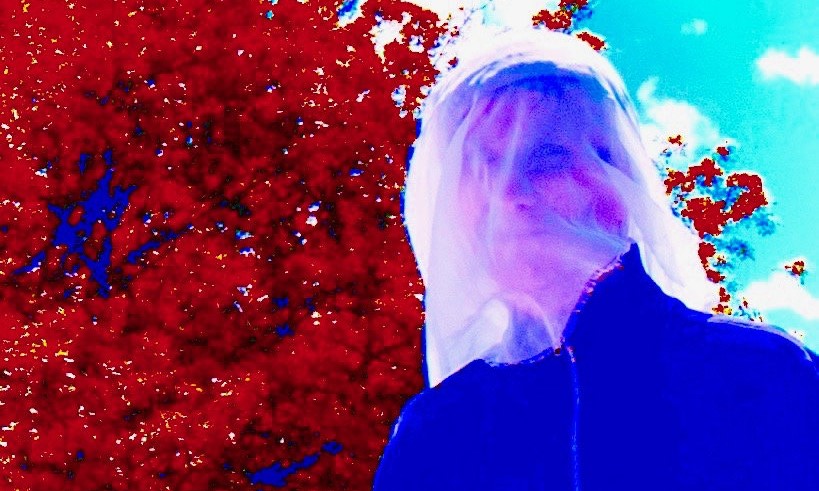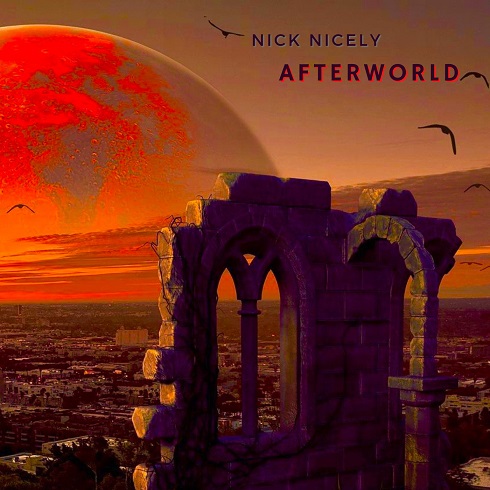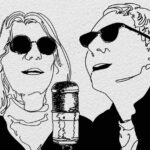
nick nicely is a self-made innovator who has dabbled in various music genres throughout his life. nick’s creative process involves experimenting with acoustic, analogue, and digital elements, as well as incorporating dream-like concepts into his music. He seamlessly blends psychedelic, sci-fi and surrealism to create a unique sound that combines both experimental and traditional elements. FACT magazine has dubbed him “The greatest pop star that never was”. His 5th album, Afterworld offers a rare glimpse into the hidden world behind nick’s notoriously meticulous completion process. Featuring vintage demos and outtakes, the album showcases the intricate creative journeys that often took nick up to 8 years to complete. Jason Barnard speaks to nick to delve deeper.
How did you choose and sequence the material that forms Afterworld ?
It was the arrival of a minidisc player from eBay last year that meant I could check out a draw full of minidiscs for the first time in 10 years and found these tracks plus numerous other versions of the tracks on Afterworld. I didn’t think they could be a release, but I was asked by a Brazilian poet 3 years earlier who had a short term job curating for a Spanish label if I had any old tracks he could make a release with. He’d left the job but I’d put together a few tracks so I tried Fruits and Keith liked them.
The tracks I chose to present to Fruits were the ones with that psych/outsider vibe, a cool tune and passable sound quality.. Things got intense during the 10 years making Space Of A Second album after Psychotropia released in 2004, lost in a labyrinth really. Overthinking run wild, but always convinced there was a psychedelic sunny upland to come.
How would you say your songs change or develop from demo to finished form?
There is no planning, the old question of when is a song finished is a big issue for all creators and certainly for myself. Generally I go past the point where others would stop, but this can mean that the originality may develop. A baroque, maximalist style can mean a demo stage is reached and then it goes to the next stage. Impossible to work with a producer as the process is so long, often just waiting out song issues,doing more experiments as long as it takes. Way back when Trevor Horn was talking to me, I kinda knew it couldn’t work with him.
I’m often looking to develop tracks to play uniquely and chasing unusual sonics within songwriting constraints can explain the time it takes to finish. I’m often looking for disorientation, hypnosis and a tripped out vibe while waiting for the track to thrill me and am prepared to sit it out while generating new sections and arrangements in pursuit of a psychedelic high within the constraints of a song…. and of course often failing and so going again. Like now. I’m 5 months into new single that sounds great to me…but parts aren’t right. As solo artist you never know for sure if you’re in a cul-de-sac or not, that’s the solo processes weakness of course.
Overall the ‘demos’ on Afterworld have the songwriting melodic part largely done, but the psychedelia is still developing. Sometimes they are better than the released track in my opinion which is a bit unnerving.
When does the material date from and do you think there’s a thread or theme that hang them together when listening back?
The material largely comes from 2004 to 2014. Eels may be a bit earlier. DCT is a bit different as it’s from a live period with backing tapes (’18-’19) including elements of the original (1980). Yes, the tracks seem to hang together well. They’re all concerned with psych/sci-fi subjects…the sonics are pretty consistent too working on the same instruments and equipment.
How do you approach the creative process when recording and producing your music?
When I started home recording in the 70s there were only a very few doing that. Nowadays practically everyone is doing it so music has in that sense come to me. Overall I’m a home DiY recording artist.
Some artists will tell you their work is 5% Inspiration and 95% Perspiration. I have developed a system that I reckon is 100% perspiration !..It’s the toughest road in terms of effort but the advantage is that as I age the usual loss of inspiration experienced by many music artists in their later years is ameliorated.
With nick nicely tunes there is often an initial songwriting moment with guitar or kbd which will be recorded..then it will be developed. This often involves rewriting, eg Hilly Fields verses were rewritten after it was mixed 5 months in! So changes occur at all stages of production, usually for the better but not always as we see with Afterworld demos.
Often the writing and recording occur together so no set system is involved as I play all the instruments. The long creative process also comes partly from a need to find solutions that feel original, deliberately doing the opposite of what is normal in an attempt to find fresh ground within 3 ½ minute songs. I agree with Leonard Cohen’s description saying he brings every version of himself to the recording process. Angry, sad, happy, intoxicated, depressed, triumphant, despairing etc. Through this hopefully solutions emerge.
My experience in the world of House music with Psychotropic means I’m comfortable developing ideas from loops and sequencing too, that’s another route to the creative process. I was perfectly placed with a home studio to make charting records in that golden period for home recording at the start of the 90s (4 UK top 10s National Dance Chart and No 1 (pop) in Italy).
How has the music industry evolved over the course of your career and what changes have you observed in terms of creative process and distribution of music?
The arrival of the internet has obviously had a seismic effect, music is free. The central change in my time has been the move of popular music away from being the spine of the culture, into a branch of the entertainment industry. There are still gently receding reminders of what is often termed pop/rock’s ‘Imperial phase’ though.
In a capitalist society it is likely that any product that becomes free, loses its kudos, its cool. The value to the average consumer of on tap music has dwindled. The attractiveness of a career in music with the minimal rewards for all except the small elites in the commercial world has similarly declined. The ‘Imperial phase’ let’s say between late 50s to early 2000’s was probably the anomaly and nowadays we see a slow return to how things were before it ie a few big stars with big voices generally with teams of songwriters,producers and professional musicians/arrangers,then playing giant concert tours… all under the control of a few large corporations.
One change, for example would be in the 60s pop music was considered an art and artists were expected to develop. Reading reviews and interviews of that time we find Paul McCartney reviewing the Byrds warning them they may get ‘stuck’ with their sound if not careful! Contrast that with today’s internet imperative to fit into the dozen or two Spotify recognised styles and stick to it (which I’ve ignored to my cost by the way). Its one of the major drawbacks of today’s system. Originality/creativity can be career suicide. As a result basic novelty has largely departed from the music ecosystem which reduces its appeal in my opinion.
However, its not all doom and gloom. For someone like myself who makes music/videos for free its possible to continue without running up debts at a small level. There is creativity to be found online, but you need to hunt around for it. It won’t be advertised. The advent of home recording has meant that the entry level to having music released has lowered considerably and hundreds of thousands of new musical pieces are released every month online. Distribution costs for this kind of release have collapsed compared to physical product distribution costs of yore. I’ve really only touched the surface of this subject here. Needs a book really.
Does the music scene where you live influence you at all?
No, beyond signing for local label Tapete in 2017 for Sleep Safari album .
Can you share some of your favourite tracks or albums that have influenced your own music.
I’ve clearly been influenced by 60s pop radio. It was so broad a spectrum that I got a grounding in all sorts of genres. Hard to imagine now, but the pirate stations and then Radio One had colossal listener figures and the music played would vary from novelty humourous songs to Hendrix , from Country to Soul and Tamla to Brit guitar groups…a heady mix and generally the cream of each genre would rise to the top. I soaked it all up.
It wasn’t til later that the psych end of the Beatles and other band’s outputs affected my own creations. My attempts to be a writer for others wasn’t working psychedelic drugs started playing a role and I married the contemporary sounds of the early 80s with that psychedelic vibe and have felt the pull of that psych influence at several points since. Key tracks would be such as See Emily Play, Tomorrow Never Knows, Days Of Pearly Spencer and maybe Johnny Remember Me. Kraftwerk (Man Machine) and the early Eurobeat like Moroder excited me at the time and meant starting work in electronics was a thrill in 1980.
An important development for me was the rise of other home producers in LA in early 2000s seeing me as a pioneer of the form. Holy Shit was a band of these home guys, Ariel Pink, John Maus and Gary War . All these artists went on to find success as the online world expanded. I simply fit their DiY ethos and had a long relationship with them and others on this scene. All my live performances since 2011 have been with them culminating in the 2019 US tour with the wonderful John Maus. They gave me confidence, encouragement and an American audience (plus deals with labels like Captured Tracks/Burger) and influenced me with their art. Ariel’s Pom Pom album and John’s We Must Be Pitiless Censors Of Ourselves are two high points.
Many contemporaries knock modern music as lacking quality. After my Psychotropic Acid House experience which rewired my brain, I find I have a better understanding of modern music and am often impressed by stuff on commercial radio and may absorb some influence from these.
And I mustn’t forget on the influence topic, the amazing Keith Jones at Fruits de Mer in the last 10 years or so. He continually influences me to explore my psych roots to good effect and has released 15-20 tracks so far, plus this very album, Afterworld demo/outtakes.
Do you have any other upcoming projects?
At the moment I am hard at work on a new nick nicely single which will be out May(ish) if the #*?**#ing thing finishes!
Further information
nick nicely, Afterworld – LP, on sale 20 March 2023 available from Fruits de Mer Records





